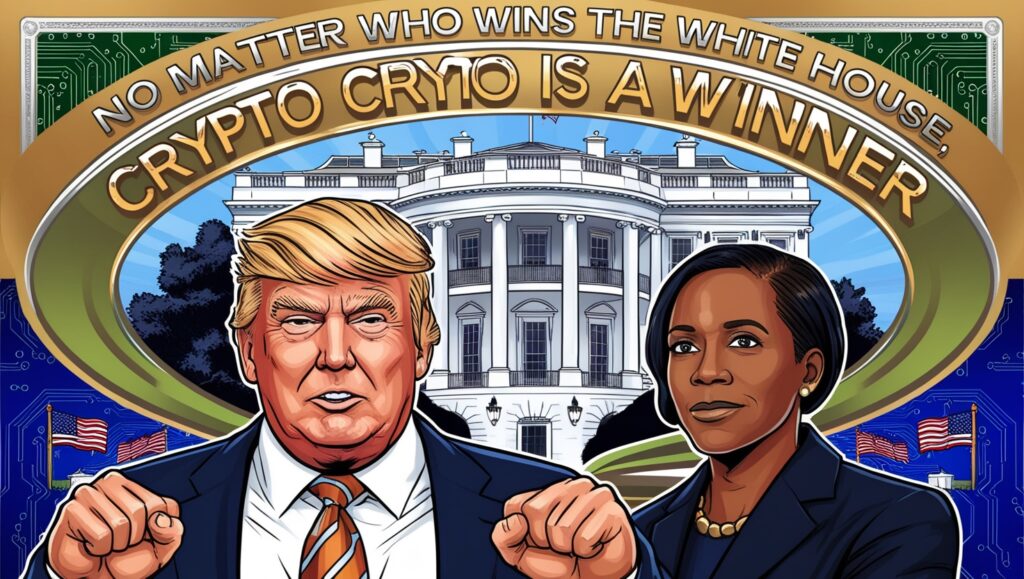Last month, Donald Trump gave a speech at the biggest bitcoin conference in the world, offering previously unheard-of support for the cryptocurrency sector. The Republican presidential nominee made bold promises to support bitcoin mining, maintain the digital asset in government reserves, and fire Securities and Exchange Commission head Gary Gensler, the industry’s archenemy in terms of regulation. The Web3 community of cryptocurrency investors and blockchain developers has experienced a rapid and welcome benefit from this enthusiastic political endorsement.
As the GOP luminary projected that bitcoin would surpass gold, a split screen featuring him and a soaring price chart was displayed to the packed crowd at a spillover side event, where attendees listened, laughed, and gave each other high fives. Trump also gained. Super PACs with deep pockets and prominent figures in the sector, including the Winklevoss twins, have contributed generously to the nominee. The nominee also threw a private event for which tickets cost over $800,000.
Even while Trump’s presence was unprecedented, what matters more is the reaction it gave Kamala Harris, his opponent. The Democrats, not wanting to miss out on possible contributions, have changed their position in response. In an effort to gain a deeper understanding of the market, Harris’ advisors reportedly arranged meetings with influential figures like stablecoin issuer Circle and contacted billionaire crypto supporter Mark Cuban.
Considering that the Democratic-led federal government has blocked the growth of cryptocurrency over the last two years with an operation dubbed Chokepoint 2.0, this is a startling about-face. With the help of the SEC acting as an enforcer in legal conflicts with companies like Coinbase and Ripple, this campaign aimed to restrict the industry’s expansion by denying it access to traditional financial services.
However, the bipartisan wooing that has recently occurred marks a turning moment for crypto, guaranteeing its upward trajectory independent of the election’s result. Robert Kennedy, a third-party candidate, was promoting cryptocurrency in Nashville.
This year’s BTC conference was a perfect example of the political power that cryptocurrency has gained. “Crypto has solidified itself as a major influence in the political arena, drawing two of the major presidential candidates,” stated Christopher Miglino, CEO and co-founder of DNA, an organization that brought together investors and startup leaders for two days of intensive networking in Nashville. “It’s time for America to join the rest of the world and embrace the changes that will happen with or without us.”
As Trump started courting the business earlier this year, the dam started to break. Subsequently, in response to such pressure, a number of Democrats, including Senate Majority Leader Charles Schumer, supported a legislative initiative in May that aimed to repeal SEC regulations that made it more difficult for banks to store cryptocurrency. The floodgates opened in Nashville.
The spectrum of politically acceptable policies, or the Overton window, has shifted dramatically in favor of cryptocurrencies in recent times. Even if the former leaders of two of the biggest exchanges in the world are incarcerated in the United States, the industry’s reputation has been restored, which has surprised politicians. Three years ago, in particular, given that Trump was the catalyst for it, having only three years prior called bitcoin a “scam.” The shift demonstrates how popular perceptions of cryptocurrencies have changed as a result of growing awareness of the possible advantages of the space and the expansion of supporters’ sphere of influence. The formerly specialized industry is now firmly positioned within the sphere of mainstream acceptance and support as both major political parties attempt to embrace the crypto sector.
Startups Need to Grab the Opportunity
This industry’s startups should take advantage of the opportunity to get ready for a more encouraging business climate.
Particularly American businesses should intensify their efforts in order to take advantage of the enhanced acceptance and possible regulatory clarity that this election season is expected to bring. These businesses have a fantastic chance to improve their technological breakthroughs, grow their consumer base, and solidify their market position. The new political dynamic will assist verticals like the tokenization of physical assets, decentralized physical infrastructure for the video streaming and spatial computing businesses, and even innovative Web3 gaming platforms.
Note this now, foreign businesses as well, particularly those in Asia, which have prospered and discovered product-market fit in their own vibrant region. The changing American market offers a perfect opportunity to develop internationalization plans and focus marketing efforts on the American market. These companies may take advantage of a more healthy and responsive market by carefully establishing themselves now, which will put them in a good position to flourish when the U.S. embraces the crypto revolution. Trump declared that the US “should build the future, not block the future.”
Whichever candidate wins the White House, cryptocurrency will have a stronger future. Nashville will be regarded as the historic turning point when cryptocurrency could finally be termed mainstream. Trump took the lead, but Harris was compelled to follow.








